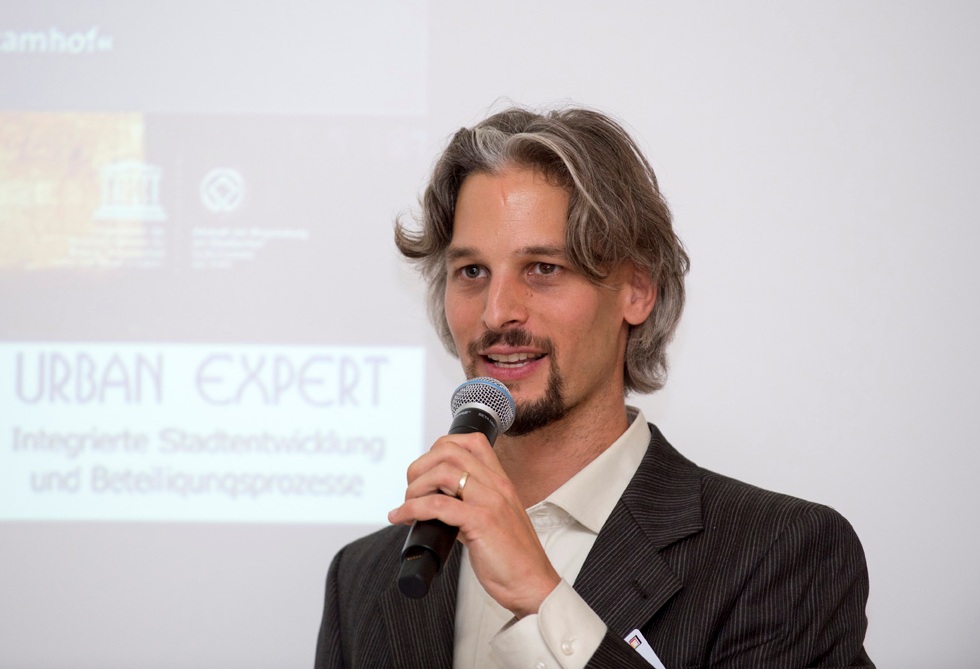Do you have the answers how to activate and motivate owners and potentials investors to reactivate vacant buildings?
Edited on
12 January 2021The participating cities of the URBACT ALT/BAU network now have a few answers to these questions. During the Transnational meeting in Constanta, 18-19.09.2019, the participants exchanged their experiences about activating and supporting owners and potentials investors for the reactivation of vacant buildings and developed jointly approaches that they want to apply in the future.
ALT/BAU Lead Expert Nils Scheffler and Martin Neubert, in charge of the ALT/BAU network give you an overview.

Identifying, activating and supporting owners for the reactivation of their vacant buildings and flats
Chemnitz presented their approach of the ‘Housing agency’ how to find out about owner information i.e. by using the land registry of the City of Chemnitz or through internet research to find out phone numbers and email addresses.
The typical approach contacting owners is first by letters together with a questionnaire, followed by a phone call or email contact. In some cases even facebook and WhatsApp has been used to contact owners. A further approach is personally visiting owners and have personal talks to talk about their plans and objectives for their property and to come to an agreement for a further cooperation for the rehabilitation or selling of their building.
Important for the owner contact and the cooperation is to be solution-oriented, polite, insistent and transparent.
Chemnitz provided further advice about dealing with owners and presented some owner typologies and case examples, which can be found in their presentation.
Turin presented the very interesting example “Stesso Piano”: a social cooperative in collaboration with a bank foundation. They provide housing for students and young workers by matching them with owners of vacant flats. They accompany flatmates and owners in writing the rental agreement, provide mediation, legal and tax advice, guarantee fund for damages and if needed accompany owners in refurbishing their apartments.
The information about vacant flats the social cooperative receives by now directly from owners as their services are well established and appreciated (guarantee fund for damages, bonus for stipulating contracts with agreed fees, contract support, etc.).
To find out more about ‘Stesso Piano’, take a look at Turin’s presentation.
The presentations were reflected in two parallel workshops by the participants, discussing and exchanging ideas what they can do
- to find out owner contact details (identification);
- that owners take into serious consideration the rehabilitation or selling of their property (activation);
- support owners in the rehabilitation or selling attempts (support).
The results of two fruitful workshops can be downloaded here.

Identifying, activating and supporting potential buyers and investors for the reactivation of vacant buildings and flats
At another workshops the participants discussed and exchanged ideas what they can do to
- identify fitting, potential buyers and investors (identification);
- attract potential buyers and investors and make them interested in the rehabilitation of vacant properties (activation);
- help investors to find the right building/flat and to ease the sales transaction (support).
The results of the workshops can be downloaded here.
Before the workshop the ‘Housing agency’ of Chemnitz presented what they have done to find potential buyers and investors for vacant, derelict buildings in Chemnitz. This was particularly through personal suggestions, known capable investors and developers in Chemnitz as well as through (property market) events.
In the presentation they also provided advice for the investor communication i.e. to meet in person and before that to collect information about the investor to have a better understanding of his/her interests and experiences. Also, when working with co-housing groups, to be patient and provide extra support in their decision making process.
At the end they presented some case studies.
This and more information can be found in their presentation.
The ALT/BAU Lead Expert Nils Scheffler presented how ‘Feasibility studies’ can be used as activation tool for owners and investors in support of the reactivation of vacant buildings.
When feasibility studies provide answers to the following questions:
- What is the condition of the building?;
- What needs to be done so that the building can be used again? and
- What does it cost?
they can be highly interesting documents for owners and potential buyers and be very helpful to discuss the rehabilitation and reuse of a building.
To be such useful documents, feasibility studies need to contain information about
- current condition of the building and urgent repair needs to prevent further deterioration (to gain time for the reactivation and rehabilitation process)
- necessary rehabilitation measures (min. - max.) to be able to reuse it
- feasible use options (housing, office space, trade, etc.; check what is allowed by planning law)
- physical reconversion options and restrictions e.g. because of monument protection.
- rehabilitation costs (min. and max. amount of investment needed; depending on use option) and potential incomes with regards to use options (rent, sale);
- funding and financing possibilities; tax incentives.
At the end of the presentation Nils Scheffler demonstrated different ways of elaborating and financing such studies and gave the example of “Rough checks”. His presentation can be downloaded here.
For more information on the results of the meeting, such as how the City of Constanta uses its GIS urban database to monitor vacanct buildings and to communicate with owners, or how the local police "encourages" owners to refurbish their buildings, see the Constanta meeting report.
The URBACT transfer network ALT/BAU unites seven European cities in their effort to support the reactivation and reuse of vacant residential buildings and flats in their cities; this by transferring and adapting the good-practice model of Chemnitz’s ‘Housing agency’. With this purpose, they meet at transnational meetings to learn and exchange about the transfer and adaptation of Chemnitz’s good-practice and other good-practices of the city partners. |
 Submitted by Nils Scheffler on
Submitted by Nils Scheffler on
